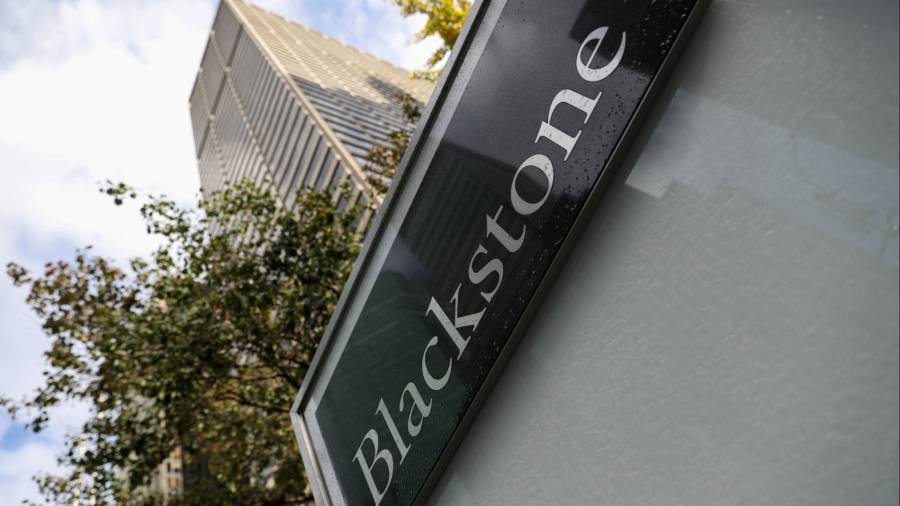
Blackstone has warned of possible delays to the launch of a new private equity fund designed for wealthy individuals, as it copes with heavy investor withdrawals at two other funds in real estate and credit aimed at a similar clientele.
The New York-based investment manager has been preparing to open a fund called the Blackstone Private Equity Strategies Fund, or BXPE, that would become its flagship strategy for rich individuals to participate in its private equity business. Blackstone has historically catered to institutional clients such as pension funds.
Blackstone has in recent days informed wealthy investors and their financial advisers that it may wait for fundraising conditions and financial markets to improve before launching BXPE, according to people familiar with the matter. Clients of Blackstone’s other “retail” products told the Financial Times they had expected the fund to be launched by early 2023.
The potential delay comes days after the group limited withdrawals from its $69bn Blackstone Real Estate Income Trust after a spate of redemption requests from its wealthy individual investors. In 2021 Blackstone launched a similar product designed for credit investments that has also received redemptions.
The curbs on withdrawals from the real estate fund have raised concerns over its future growth and hit Blackstone’s share price. Blackstone declined to comment.
Blackstone has also informed clients that it will not be raising new capital for vehicles known as Blackstone Total Alternative Solutions funds, which were designed nearly a decade ago when it initially sought to attract assets from wealthy individuals.
The BTAS funds have a 10-year life and are raised annually. Blackstone instead plans to direct interested clients to BXPE, designed to be a perpetual vehicle that does not return capital at the end of a fund’s life. BXPE clients would commit their capital when they initially invest instead of having it called on a deal by deal basis.
Since the years just after the financial crisis, Blackstone founder Stephen Schwarzman has been seeking ways to make the buyout business available to a broader swath of investors beyond the pensions, endowments and sovereign wealth funds that have traditionally been the firm’s clients.
BXPE is being set up to invest in corporate buyouts and equity-oriented strategies including late-stage venture investments, musical royalties and the purchase of stakes in other private equity firms or their funds.
The fund is poised to be Blackstone’s most complex product yet. Unlike Breit and Bcred, the sister credit fund, which both generate a significant portion of their returns from regular cash distributions to investors, BXPE will not pay dividends.
Investors will earn their returns from episodic and unpredictable asset sales, or the complex and often subjective mark-up or writedown of the quarterly net asset value of its holdings.
That structure may run into issues if investors begin to withdraw their money when markets fall or financial conditions become stressed, said Kevin Kneafsey, a senior investment strategist at Allspring Global Investments.
“The mechanism is going to run into a problem when people are taking money out and there needs to be a valuation of the underlying assets,” said Kneafsey, who noted that if Blackstone were to value the portfolio too low it could fuel redemptions. If the assets are valued too high, the investors redeeming from the fund at the inflated prices would “effectively be taking money from the people who aren’t redeeming”, he added.
“The valuations of BXPE’s assets may differ from liquidation values that could be realised in the event that BXPE were forced to sell assets,” the BXPE prospectus warns.
Since last spring investors have been withdrawing from Breit at an increasing rate, hitting limits Blackstone established to safeguard against the risk of being forced into a fire sale of illiquid real estate properties to meet redemptions.
Breit and Bcred allow for 2 per cent of total assets to be redeemed by clients each month, with a maximum of 5 per cent allowed in a calendar quarter. In recent months, both funds have hit their redemption caps, though withdrawals have not been limited for Bcred.
BXPE will allow investors to commit on a monthly basis, but only allow withdrawals each quarter up to a 5 per cent cap. BXPE will invest up to 80 cent of its assets in equity-oriented strategies and up to 20 per cent in debt securities, according to filings.
When it launches, BXPE will compete against products managed by competitors including Partners Group, Hamilton Lane and StepStone Group.
Executives at these funds conceded that Breit’s recent withdrawal limits and more volatility may slow new commitments from wealthy investors. But they expressed confidence in the market’s long-term prospects.
Bob Long, chief executive of StepStone Private Wealth, told the FT that equity-oriented funds may not suffer the same redemption risks as Breit because there are no obvious ways to get public market exposure to private equity strategies, unlike in real estate or credit where investors have access to scores of publicly listed vehicles.
Additional reporting by Sujeet Indap in New York